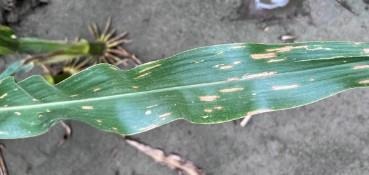Many people are concerned about the 2022 outbreak of avian influenza, or bird flu, that is affecting domestic poultry, waterfowl, raptors, and some shorebirds in the U.S. and Canada. Because the current strain (H5N1) causes heavy losses to poultry, it is referred to as highly pathogenic avian influenza, or HPAI. Note that transmission of avian influenza from birds to humans is very rare, according to the Centers for Disease Control. As of October 26, one person in the U.S. has tested positive for avian influenza and developed mild symptoms, in Colorado in April 2022.

Migratory waterfowl, like these Snow Geese, are the most common carriers of avian influenza.
There has been confusion about whether people should take down their feeders to stop the spread of this disease among wild birds. We checked with Dr. Julianna Lenoch, who directs the USDA APHIS National Wildlife Disease Program, and we’ve compiled the following summaries of key points regarding HPAI, especially among songbirds and other feeder visitors.
Low Risk Of Avian Flu To Songbirds
There is currently very low risk of an outbreak among wild songbirds, and no official recommendation to take down feeders unless you also keep domestic poultry, according to the National Wildlife Disease Program. We do always recommend that you clean bird feeders and birdbaths regularly as a way to keep many kinds of diseases at bay.
We also always recommend that you follow any recommendations put out by your state government, even in cases where that advice conflicts with ours. We will update this page as the situation develops.
How Do We Know Songbirds Are At Low Risk?
- USDA APHIS has a strong, multiyear surveillance program that routinely samples wild birds, including flocks of songbirds (and other species such as Rock Pigeons and Mourning Doves that are often around humans), for the presence of avian influenza. So far in 2022, they’ve detected the HPAI strain in 3,124 wild birds, with 57 detections in songbirds (see below for a list of species). Latest info about the outbreak.
- Avian influenza does not affect all types of birds equally. The “highly pathogenic” part of the term HPAI refers specifically to the severity of the disease in poultry, not necessarily in other bird species. For example, waterfowl often carry and transmit bird flu, but rarely get sick from the disease (even from HPAI strains). Raptors are much more sensitive to the disease than waterfowl. Domestic poultry are extremely susceptible to HPAI and spread the disease easily, leading to up to 100% mortality of affected flocks.
- Songbirds are much less likely than waterfowl to contract avian influenza and less likely to shed large amounts of virus, meaning they do not transmit the disease easily. (See Shriner and Root 2020 for a detailed review in the journal Viruses.)
- According to a separate study in the Journal of Wildlife Diseases, “…although passerines and terrestrial wild birds may have a limited role in the epidemiology of IAV [avian influenza A viruses] when associated with infected domestic poultry or other aberrant hosts, there is no evidence supporting their involvement as natural reservoirs for IAV.” (Slusher et al. 2014)
- For these reasons, it is unlikely that bird feeders will contribute to an outbreak among songbirds.
If Songbirds Are At Low Risk, Why Are People Who Keep Poultry Advised To Take Down Their Bird Feeders?
- The main concern with songbirds is the chance that a rare individual might transmit an infection to poultry. This is a concern because poultry are so much more vulnerable than songbirds to HPAI.
- The key intervention is to keep songbirds away from poultry; it’s less important to keep songbirds away from each other.
- If you have a backyard poultry flock, these are the most important steps to take:
(click for full info on these biosecurity measures from USDA APHIS)
- As a secondary measure, USDA APHIS recommends for poultry owners to take down wild bird feeders or keep them well away from their captive flock
If You Keep Nest Boxes:
Avian influenza is only rarely transmitted to humans, according to the USDA, but nevertheless our NestWatch project always advises good hygiene and highly recommends that people wear disposable gloves and/or wash their hands thoroughly after checking nest boxes. Most birds that use nest boxes are songbirds, which are at low risk for contracting or transmitting avian influenza. If you monitor waterfowl or raptor nests (e.g., Wood Duck, Common Merganser, Canada Goose, American Kestrel, Barred Owl), we suggest you wear gloves, change or wash gloves and disinfect equipment between nest boxes, wear a mask when cleaning out nest boxes, and change clothes and footwear before visiting any domestic poultry.
If You Are A Wildlife Rehabilitator:
Wildlife rehabilitators should take precautions when accepting sick birds so that they don’t inadvertently introduce HPAI to the rest of their patients. Here’s further guidance for rehabbers, from USDA APHIS. Rehabbers in New York State are also encouraged to contact the Cornell Wildlife Health Lab for more information.
What To Do If You Find A Sick Or Dead Bird:
Avoid handling sick or dead birds. Instead, call your state wildlife health agency; they can determine cause of death and send the bird to the appropriate lab for testing. Additionally, keep pets (including pet birds) away from sick or dead wild birds.
Click here to see more...